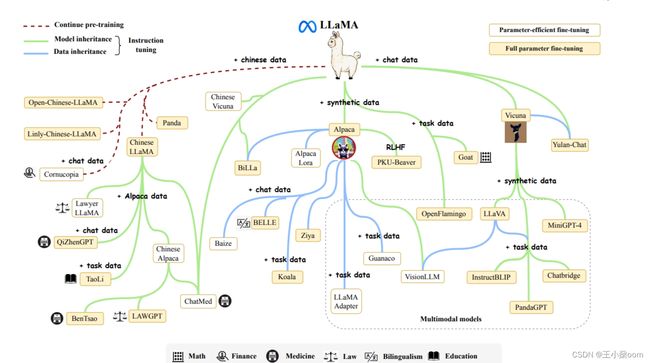- LLM中 最后一个词语的表征(隐藏状态)通常会融合前面所有词语的信息吗?
ZhangJiQun&MXP
教学2024大模型以及算力2021AIpython机器学习算法深度学习人工智能
LLM中最后一个词语的表征(隐藏状态)通常会融合前面所有词语的信息吗?在大语言模型(LLM)中,最后一个词语的表征(隐藏状态)通常会融合前面所有词语的信息,这是由LLM的核心架构(以Transformer为基础)决定的,具体可以从以下角度理解:1.核心机制:自注意力(Self-Attention)的作用现代LLM(如GPT系列、Qwen等)均基于Transformer架构,其核心是自注意力机制。在
- LLM的表征做减法的是什么,自然语言是一个矩阵,怎么进行减法的
ZhangJiQun&MXP
教学2024大模型以及算力2021AIpython计算机视觉人工智能机器学习算法深度学习
LLM的表征做减法的是什么,自然语言是一个矩阵,怎么进行减法的有个假设:就是最后一个词语融合了前面词语的信息减法操作主要用于提取模型内部表征中的"诚实性"概念向量。具体来说,这是通过对比诚实和不诚实场景下的模型隐藏状态实现的。importtorchfromtransformersimportAutoModelForCausalLM,AutoTokenizer,AutoConfigimportnum
- LLM-生成器判别器的实现
总结首先,使用GPT模型获取每个词的生成概率pLLMp_{LLM}pLLM。然后,使用训练好的生成判别器,对每个可能的生成结果进行打分,得到pθ(c∣x1:t)p_\theta(c|x_{1:t})pθ(c∣x1:t)。最后,结合两者的输出,用贝叶斯规则调整每个词的概率,选择调整后的概率最高的词作为输出。通过这样的组合,生成过程可以更好地满足预期需求,如生成符合特定风格或格式的文本。要在使用已经预
- AI MCP教程之 什么是 MCP?利用本地 LLM 、MCP、DeepSeek 集成构建您自己的 AI 驱动工具
知识大胖
NVIDIAGPU和大语言模型开发教程人工智能mcpdeepseek
介绍利用模型上下文协议(MCP)的工具吸引了我们的注意力—将AI变成触手可及的生产力引擎。它们巧妙、高效,让人难以抗拒。但如果您可以将这样的功能添加到自己的工具中,会怎么样呢?在本指南中,我将引导您构建一个具有本地运行的大型语言模型(LLM)和MCP集成的AI工具-让您以类似的方式自动执行利用MCP的工具您喜欢的任务。推荐文章《AnythingLLM教程系列之12AnythingLLM上的Olla
- 使用 Ollama 、 DeepSeek和QWEN的模型上下文协议 (MCP) ,使用本地 LLM 教程的 MCP 服务器
知识大胖
NVIDIAGPU和大语言模型开发教程服务器运维人工智能qwen2vldeepseek
简介模型上下文协议:MCP服务器据称是AI领域的下一个重大改变者,它将使AI代理变得比我们想象的更加先进。MCP或模型上下文协议由Anthropic去年发布,它可以帮助LLM连接软件并对其进行控制。但有一个问题大多数MCP服务器都与ClaudeAI兼容,尤其是ClaudeAI桌面应用程序,但它们有自己的限制。有没有办法我们可以使用本地LLM运行MCP服务器?是的,在这个特定的逐步详细教程中,我们将
- 在 Obsidian 中本地使用 DeepSeek — 无需互联网!
知识大胖
NVIDIAGPU和大语言模型开发教程人工智能deepseek
简介您是否想在Obsidian内免费使用类似于ChatGPT的本地LLM?如果是,那么本指南适合您!我将引导您完成在Obsidian中安装和使用DeepSeek-R1模型的确切步骤,这样您就可以在笔记中拥有一个由AI驱动的第二大脑。推荐文章《24GBGPU中的DeepSeekR1:UnslothAI针对671B参数模型进行动态量化》权重1,DeepSeek类《在RaspberryPi上运行语音识别
- Llama-Omni会说话的人工智能“语音到语音LLM” 利用低延迟、高质量语音转语音 AI 彻底改变对话方式(教程含源码)
知识大胖
NVIDIAGPU和大语言模型开发教程llama人工智能nvidiallm
介绍“单靠技术是不够的——技术与文科、人文学科的结合,才能产生让我们心花怒放的成果。”——史蒂夫·乔布斯近年来,人机交互领域发生了重大变化,尤其是随着ChatGPT、GPT-4等大型语言模型(LLM)的出现。虽然这些模型主要基于文本,但人们对语音交互的兴趣日益浓厚,以使人机对话更加无缝和自然。然而,实现语音交互而不受语音转文本处理中常见的延迟和错误的影响仍然是一个挑战。关键字:Llama-Omni
- OpenWebUI系列之 如何通过docker自动将其更新到OpenWebUI最新版本
知识大胖
NVIDIAGPU和大语言模型开发教程dockerllmopenwebui
实战需求OpenWebUI是一个可扩展、功能丰富且用户友好的自托管WebUI,旨在完全离线运行。它支持各种LLM运行器,包括Ollama和OpenAI兼容API。如何通过docker自动将其更新到OpenWebUI最新版本?系列文章《OpenWebUI系列之如何通过docker更新到OpenWebUI的最新版本》权重0,本地类、opewebui类《OpenWebUI系列之如何通过docker自动将
- AnythingLLM教程系列之 12 AnythingLLM 上的 Ollama 与 MySQL+PostgreSQL
知识大胖
NVIDIAGPU和大语言模型开发教程mysqlpostgresql数据库anythingllmollama
简介一款全栈应用程序,可让您将任何文档、资源或内容转换为上下文,任何LLM都可以在聊天期间将其用作参考。此应用程序允许您选择要使用的LLM或矢量数据库,并支持多用户管理和权限。本文将介绍如何在AnythingLLM上将Ollama与MySQL+PostgreSQL连接起来。系列文章如何安装《无需任何代码构建自己的大模型知识库:AnythingLLM最易于使用的一体化AI应用程序,可以执行RAG、A
- AnythingLLM教程系列之 09 AnythingLLM 支持自定义音频转录提供程序
知识大胖
NVIDIAGPU和大语言模型开发教程llama3anythingllmllm
什么是AnythingLLM?AnythingLLM是最易于使用的一体化AI应用程序,可以执行RAG、AI代理等操作,且无需任何代码或基础设施难题。您需要为您的企业或组织提供一款完全可定制、私有且一体化的AI应用程序,该应用程序基本上是一个具有许可的完整ChatGPT,但具有任何LLM、嵌入模型或矢量数据库。如何安装《无需任何代码构建自己的大模型知识库:AnythingLLM最易于使用的一体化AI
- AnythingLLM教程系列之 04 AnythingLLM 允许您以正确的格式导出聊天日志,以构建 GPT-3.5 和 OpenAI 上其他可用模型的微调模型(教程含安装步骤)
知识大胖
NVIDIAGPU和大语言模型开发教程llama3aianythinllmllama
什么是AnythingLLM?AnythingLLM是最易于使用的一体化AI应用程序,可以执行RAG、AI代理等操作,且无需任何代码或基础设施难题。您需要为您的企业或组织提供一款完全可定制、私有且一体化的AI应用程序,该应用程序基本上是一个具有许可的完整ChatGPT,但具有任何LLM、嵌入模型或矢量数据库。如何安装《无需任何代码构建自己的大模型知识库:AnythingLLM最易于使用的一体化AI
- 【AI大模型】LLM模型架构深度解析:BERT vs. GPT vs. T5
我爱一条柴ya
学习AI记录ai人工智能AI编程python
引言Transformer架构的诞生(Vaswanietal.,2017)彻底改变了自然语言处理(NLP)。在其基础上,BERT、GPT和T5分别代表了三种不同的模型范式,主导了预训练语言模型的演进。理解它们的差异是LLM开发和学习的基石。一、核心架构对比特性BERT(BidirectionalEncoder)GPT(GenerativePre-trainedTransformer)T5(Text
- LLM 大模型学习必知必会系列(十三):基于SWIFT的VLLM推理加速与部署实战
汀、人工智能
LLM技术汇总人工智能自然语言处理LLMAgentvLLMAI大模型大模型部署
LLM大模型学习必知必会系列(十三):基于SWIFT的VLLM推理加速与部署实战1.环境准备GPU设备:A10,3090,V100,A100均可.#设置pip全局镜像(加速下载)pipconfigsetglobal.index-urlhttps://mirrors.aliyun.com/pypi/simple/#安装ms-swiftpipinstall'ms-swift[llm]'-U#vllm与
- [论文阅读]Distilling Step-by-Step! Outperforming Larger Language Models with Less Training Data and Smal
0x211
论文阅读语言模型人工智能自然语言处理
中文译名:逐步蒸馏!以较少的训练数据和较小的模型规模超越较大的语言模型发布链接:http://arxiv.org/abs/2305.02301AcceptedtoFindingsofACL2023阅读原因:近期任务需要用到蒸馏操作,了解相关知识核心思想:改变视角。原来的视角:把LLMs视为噪声标签的来源。现在的视角:把LLMs视为能够推理的代理。方法好在哪?需要的数据量少,得到的结果好。文章的方法
- 【实战AI】macbook M1 本地ollama运行deepseek
东方鲤鱼
chatAImacosaillamaAIGCchatgpt
由于deepseek官网或者Aapi调用会有网络延迟或不响应的情况,故在本地搭建部署;前提条件1.由于需要拉取开源镜像,受网络限制,部分资源在前提中会下载的更快!请自行;2.设备macbookM132G下载ollamaOllama是一款跨平台推理框架客户端(MacOS、Windows、Linux),专为无缝部署大型语言模型(LLM)(如Llama2、Mistral、Llava等)而设计。通过一键式
- 思维链革命:让大模型突破“机器思考”的边界
John Song
AI人工智能思维链2.0CoT多模态思维链元认知优化
以下是对LilianWeng思维链技术深度解析文章(原文链接)的博客化重构,融合技术本质与应用实践:思维链革命:让大模型突破“机器思考”的边界——解析ChainofThought技术体系与下一代推理架构一、从黑箱到透明思考:CoT的核心突破传统LLM困境:“大模型如同天才自闭症患者——知识渊博却无法展示思考路径”CoT解决方案:#标准CoT提示模板prompt="""问题:小明有5个苹果,吃掉2个
- LLM Agent在多模态任务中的推理机制详解
文章目录一、引言二、多模态LLMAgent的基本架构2.1系统组成2.2工作流程图三、多模态表示与对齐3.1跨模态嵌入空间3.2模态对齐技术四、多模态推理策略4.1基于提示的推理(Prompt-basedReasoning)4.2多模态思维链(CoT)推理4.3多模态工具使用五、实现案例:多模态问答系统5.1系统架构5.2示例应用六、高级多模态推理技术6.1多模态递归推理6.2多模态记忆与检索6.
- 在mac m1基于llama.cpp运行deepseek
lama.cpp是一个高效的机器学习推理库,目标是在各种硬件上实现LLM推断,保持最小设置和最先进性能。llama.cpp支持1.5位、2位、3位、4位、5位、6位和8位整数量化,通过ARMNEON、Accelerate和Metal支持Apple芯片,使得在MACM1处理器上运行Deepseek大模型成为可能。1下载llama.cppgitclonehttps://github.com/ggerg
- LLaMA-Omni 深度解析:打开通往无缝人机语音交互的大门
kakaZhui
前沿多模态大模型:论文与实战llama交互LLMTTS语音识别语音合成人工智能
一、引言:语音交互大模型今天我们来看语音交互大模型LLaMA-Omni,它由中国科学院计算技术研究所的研究者们推出,是一个基于强大的Llama-3.1-8B-Instruct构建的语音语言模型。LLaMA-Omni不仅实现了低至226ms的惊人交互延迟,还能同时生成高质量的文本与语音回复,真正意义上让大语言模型(LLM)具备了“听说”的能力。这篇博客将带你由浅入深,全方位地探索LLaMA-Omni
- 在LLM快速迭代时代构建持久AI应用:架构设计与实施策略
引言:技术浪潮下的开发困境大型语言模型(LLM)的发展速度令人瞠目:从GPT-3到GPT-4,从Claude1到Claude3,从Llama1到Llama3,迭代周期正在从"年"缩短到"月"。作为一名AI应用开发者,我亲身经历了这种技术浪潮带来的挑战:昨天精心调优的prompt今天可能失效;上个季度集成的模型这个季度已有更优选择;刚完成的功能设计瞬间被新模型的能力超越。在如此快速变化的环境中,如何
- 大型语言模型(LLM, Large Language Models)基模和 Chat 模型之间的区别
一、概述最近看大模型相关的知识,有看到大模型都有基础模型(base)和对话模型(chat),不太清楚什么时候用到基础模型,什么时候用到对话模型,故有此文。通过了解,最简单的概述就是基于基础模型会训练出一个对话(Chat)模型,对话模型主要用于对话场景,基础模型主要做文本生成,没有上下文对话的能力。在模型命名上也能看出来区别,例如:Qwen-72B和Qwen-72B-ChatChatGLM3-6B-
- SpringBoot集成LangChain4j:构建智能AI应用全解析
java干货仓库
八股文汇总Spring大模型springboot人工智能后端
在企业级应用中融入大语言模型(LLM)能力已成为趋势,而LangChain4j作为专为Java设计的LLM集成框架,与SpringBoot的结合为开发者提供了强大而灵活的解决方案。本文将从基础概念到高级应用,全面解析如何利用这一组合构建智能AI应用。一、LangChain4j概述1.1什么是LangChain4j?LangChain4j是一个开源Java框架,灵感来源于Python的LangCha
- 基于 esp32-s3,结合私有化大模型,集asr语音识别、llm大模型、tts语音合成,设计一个技术方案,要求用websocket保持长链接,
以下方案演示了如何基于ESP32-S3,通过私有化大模型组合ASR(语音识别)、LLM(语言大模型)和TTS(语音合成)来构建一个语音交互系统,并且通过WebSocket保持与服务器的长连接通讯。整体方案分为以下几个部分:系统整体架构与数据流协议设计与消息格式服务器端实现示例ESP32-S3端实现示例运行流程与示例下面将对各部分进行详细说明。ESP32-S3没想到私有化大模型速度也能这么快ESP3
- 详解LLMOps,将DevOps用于大语言模型开发
大家好,在机器学习领域,随着技术的不断发展,将大型语言模型(LLMs)集成到商业产品中已成为一种趋势,同时也带来了许多挑战。为了有效应对这些挑战,数据科学家们转向了一种新型的DevOps实践LLM-OPS,专为大型语言模型的开发和维护而设计。本文将介绍LLM-OPS的核心思想,并分析这一策略如何帮助数据科学家更高效地运用DevOps的优秀实践,从而在语言模型的开发和部署过程中,提升工作效率和成果的
- 代码与 AI 的交响乐:探索 avante.nvim 的智能编程革命
步子哥
人工智能
在编程的世界里,代码不仅是逻辑的堆砌,更是一场思想与技术的交响乐。avante.nvim,一个运行在Neovim上的AI驱动插件,正以其智能化的代码补全、生成和编辑功能,为开发者奏响一曲高效与创新的乐章。本文将带你走进avante.nvim的世界,探索它如何通过大语言模型(LLM)和上下文感知机制,重新定义编程的艺术与科学。从灵感火花到代码现实:AI驱动的编程新时代想象一下,你正在编写一个复杂的P
- 零代码玩转大模型!LLaMA Factory:你的专属模型精修师
jane_xing
人工智能llama
你是否曾对大语言模型(LLM)的强大能力心驰神往,却苦于以下难题?想定制专属模型?微调代码看不懂,环境配置太复杂…硬件资源有限?动辄需要数张A100,普通设备望而却步…中文任务不给力?原生模型中文理解弱,效果难达预期…部署门槛高?模型优化、压缩、服务化步步是坎?好消息是:LLaMAFactory来拯救你啦!它就像一家功能齐全的“模型精修店”,让你无需深厚AI功底,也能轻松定制、优化和部署大模型!一
- 掌握LLM工程课,让你的AI之旅充满惊喜
掌控AI时代的密码:深入LLM工程课程在人工智能迅猛发展的今天,对大语言模型(LLM)的深入理解和应用能力已经成为引领技术潮流的重要基石。为了帮助更多人掌握这项核心技术,特此分享关于LLM工程的一项出色在线课程。这门课程引导您通过一段为期八周的旅程,掌握AI及大语言模型的精髓,从而达到熟练应用的水平。探索LLM的世界课程以项目为驱动,通过循序渐进的学习模块,帮助您在LLM的世界中行稳致远。每周的内
- 【论文阅读】【IEEE TCYB 2023】Edge-Guided Recurrent Positioning Network forSalient Object Detection in Opt
引言任务:光学遥感图像中显著目标检测论文地址:Edge-GuidedRecurrentPositioningNetworkforSalientObjectDetectioninOpticalRemoteSensingImages|IEEEJournals&Magazine|IEEEXplore代码地址:前置知识一、摘要目前由于光学rsi中目标类型多样、目标尺度多样、目标方向众多以及背景杂乱,现有S
- Dify小白入门指南:通过官方文档学习工作流编排和API调用
伟大无须多言
学习difyai
Dify小白入门指南:通过官方文档学习工作流编排和API调用一、Dify平台简介与核心功能Dify是一个开源的LLM应用开发平台,被设计为一个"生成式AI应用创新引擎",它提供了从Agent构建到AI工作流编排、RAG检索、模型管理等全方位能力,帮助用户轻松构建和运营生成式AI原生应用。作为一个强大的LLMOps平台,Dify已成为众多开发者构建AI应用的首选工具,尤其适合想要快速开发AI应用但缺
- 大模型 Agent(智能体)技术简介
北京地铁1号线
自然语言处理与大语言模型大模型语言模型Agent
大模型Agent(智能体)技术是当前人工智能领域的前沿方向,它赋予大型语言模型(LLM)自主感知、规划、决策和行动的能力,使其不再局限于“被动应答”,而是能主动完成复杂任务。简单来说,Agent是一个以LLM为“大脑”的自主智能系统,能够理解目标、使用工具、与环境交互并最终解决问题。一、为什么需要Agent?——大模型的局限与Agent的使命传统的大语言模型(如GPT-4、Claude、Llama
- mongodb3.03开启认证
21jhf
mongodb
下载了最新mongodb3.03版本,当使用--auth 参数命令行开启mongodb用户认证时遇到很多问题,现总结如下:
(百度上搜到的基本都是老版本的,看到db.addUser的就是,请忽略)
Windows下我做了一个bat文件,用来启动mongodb,命令行如下:
mongod --dbpath db\data --port 27017 --directoryperdb --logp
- 【Spark103】Task not serializable
bit1129
Serializable
Task not serializable是Spark开发过程最令人头疼的问题之一,这里记录下出现这个问题的两个实例,一个是自己遇到的,另一个是stackoverflow上看到。等有时间了再仔细探究出现Task not serialiazable的各种原因以及出现问题后如何快速定位问题的所在,至少目前阶段碰到此类问题,没有什么章法
1.
package spark.exampl
- 你所熟知的 LRU(最近最少使用)
dalan_123
java
关于LRU这个名词在很多地方或听说,或使用,接下来看下lru缓存回收的实现
1、大体的想法
a、查询出最近最晚使用的项
b、给最近的使用的项做标记
通过使用链表就可以完成这两个操作,关于最近最少使用的项只需要返回链表的尾部;标记最近使用的项,只需要将该项移除并放置到头部,那么难点就出现 你如何能够快速在链表定位对应的该项?
这时候多
- Javascript 跨域
周凡杨
JavaScriptjsonp跨域cross-domain
- linux下安装apache服务器
g21121
apache
安装apache
下载windows版本apache,下载地址:http://httpd.apache.org/download.cgi
1.windows下安装apache
Windows下安装apache比较简单,注意选择路径和端口即可,这里就不再赘述了。 2.linux下安装apache:
下载之后上传到linux的相关目录,这里指定为/home/apach
- FineReport的JS编辑框和URL地址栏语法简介
老A不折腾
finereportweb报表报表软件语法总结
JS编辑框:
1.FineReport的js。
作为一款BS产品,browser端的JavaScript是必不可少的。
FineReport中的js是已经调用了finereport.js的。
大家知道,预览报表时,报表servlet会将cpt模板转为html,在这个html的head头部中会引入FineReport的js,这个finereport.js中包含了许多内置的fun
- 根据STATUS信息对MySQL进行优化
墙头上一根草
status
mysql 查看当前正在执行的操作,即正在执行的sql语句的方法为:
show processlist 命令
mysql> show global status;可以列出MySQL服务器运行各种状态值,我个人较喜欢的用法是show status like '查询值%';一、慢查询mysql> show variab
- 我的spring学习笔记7-Spring的Bean配置文件给Bean定义别名
aijuans
Spring 3
本文介绍如何给Spring的Bean配置文件的Bean定义别名?
原始的
<bean id="business" class="onlyfun.caterpillar.device.Business">
<property name="writer">
<ref b
- 高性能mysql 之 性能剖析
annan211
性能mysqlmysql 性能剖析剖析
1 定义性能优化
mysql服务器性能,此处定义为 响应时间。
在解释性能优化之前,先来消除一个误解,很多人认为,性能优化就是降低cpu的利用率或者减少对资源的使用。
这是一个陷阱。
资源时用来消耗并用来工作的,所以有时候消耗更多的资源能够加快查询速度,保持cpu忙绿,这是必要的。很多时候发现
编译进了新版本的InnoDB之后,cpu利用率上升的很厉害,这并不
- 主外键和索引唯一性约束
百合不是茶
索引唯一性约束主外键约束联机删除
目标;第一步;创建两张表 用户表和文章表
第二步;发表文章
1,建表;
---用户表 BlogUsers
--userID唯一的
--userName
--pwd
--sex
create
- 线程的调度
bijian1013
java多线程thread线程的调度java多线程
1. Java提供一个线程调度程序来监控程序中启动后进入可运行状态的所有线程。线程调度程序按照线程的优先级决定应调度哪些线程来执行。
2. 多数线程的调度是抢占式的(即我想中断程序运行就中断,不需要和将被中断的程序协商)
a)
- 查看日志常用命令
bijian1013
linux命令unix
一.日志查找方法,可以用通配符查某台主机上的所有服务器grep "关键字" /wls/applogs/custom-*/error.log
二.查看日志常用命令1.grep '关键字' error.log:在error.log中搜索'关键字'2.grep -C10 '关键字' error.log:显示关键字前后10行记录3.grep '关键字' error.l
- 【持久化框架MyBatis3一】MyBatis版HelloWorld
bit1129
helloworld
MyBatis这个系列的文章,主要参考《Java Persistence with MyBatis 3》。
样例数据
本文以MySQL数据库为例,建立一个STUDENTS表,插入两条数据,然后进行单表的增删改查
CREATE TABLE STUDENTS
(
stud_id int(11) NOT NULL AUTO_INCREMENT,
- 【Hadoop十五】Hadoop Counter
bit1129
hadoop
1. 只有Map任务的Map Reduce Job
File System Counters
FILE: Number of bytes read=3629530
FILE: Number of bytes written=98312
FILE: Number of read operations=0
FILE: Number of lar
- 解决Tomcat数据连接池无法释放
ronin47
tomcat 连接池 优化
近段时间,公司的检测中心报表系统(SMC)的开发人员时不时找到我,说用户老是出现无法登录的情况。前些日子因为手头上 有Jboss集群的测试工作,发现用户不能登录时,都是在Tomcat中将这个项目Reload一下就好了,不过只是治标而已,因为大概几个小时之后又会 再次出现无法登录的情况。
今天上午,开发人员小毛又找到我,要我协助将这个问题根治一下,拖太久用户难保不投诉。
简单分析了一
- java-75-二叉树两结点的最低共同父结点
bylijinnan
java
import java.util.LinkedList;
import java.util.List;
import ljn.help.*;
public class BTreeLowestParentOfTwoNodes {
public static void main(String[] args) {
/*
* node data is stored in
- 行业垂直搜索引擎网页抓取项目
carlwu
LuceneNutchHeritrixSolr
公司有一个搜索引擎项目,希望各路高人有空来帮忙指导,谢谢!
这是详细需求:
(1) 通过提供的网站地址(大概100-200个网站),网页抓取程序能不断抓取网页和其它类型的文件(如Excel、PDF、Word、ppt及zip类型),并且程序能够根据事先提供的规则,过滤掉不相干的下载内容。
(2) 程序能够搜索这些抓取的内容,并能对这些抓取文件按照油田名进行分类,然后放到服务器不同的目录中。
- [通讯与服务]在总带宽资源没有大幅增加之前,不适宜大幅度降低资费
comsci
资源
降低通讯服务资费,就意味着有更多的用户进入,就意味着通讯服务提供商要接待和服务更多的用户,在总体运维成本没有由于技术升级而大幅下降的情况下,这种降低资费的行为将导致每个用户的平均带宽不断下降,而享受到的服务质量也在下降,这对用户和服务商都是不利的。。。。。。。。
&nbs
- Java时区转换及时间格式
Cwind
java
本文介绍Java API 中 Date, Calendar, TimeZone和DateFormat的使用,以及不同时区时间相互转化的方法和原理。
问题描述:
向处于不同时区的服务器发请求时需要考虑时区转换的问题。譬如,服务器位于东八区(北京时间,GMT+8:00),而身处东四区的用户想要查询当天的销售记录。则需把东四区的“今天”这个时间范围转换为服务器所在时区的时间范围。
- readonly,只读,不可用
dashuaifu
jsjspdisablereadOnlyreadOnly
readOnly 和 readonly 不同,在做js开发时一定要注意函数大小写和jsp黄线的警告!!!我就经历过这么一件事:
使用readOnly在某些浏览器或同一浏览器不同版本有的可以实现“只读”功能,有的就不行,而且函数readOnly有黄线警告!!!就这样被折磨了不短时间!!!(期间使用过disable函数,但是发现disable函数之后后台接收不到前台的的数据!!!)
- LABjs、RequireJS、SeaJS 介绍
dcj3sjt126com
jsWeb
LABjs 的核心是 LAB(Loading and Blocking):Loading 指异步并行加载,Blocking 是指同步等待执行。LABjs 通过优雅的语法(script 和 wait)实现了这两大特性,核心价值是性能优化。LABjs 是一个文件加载器。RequireJS 和 SeaJS 则是模块加载器,倡导的是一种模块化开发理念,核心价值是让 JavaScript 的模块化开发变得更
- [应用结构]入口脚本
dcj3sjt126com
PHPyii2
入口脚本
入口脚本是应用启动流程中的第一环,一个应用(不管是网页应用还是控制台应用)只有一个入口脚本。终端用户的请求通过入口脚本实例化应用并将将请求转发到应用。
Web 应用的入口脚本必须放在终端用户能够访问的目录下,通常命名为 index.php,也可以使用 Web 服务器能定位到的其他名称。
控制台应用的入口脚本一般在应用根目录下命名为 yii(后缀为.php),该文
- haoop shell命令
eksliang
hadoophadoop shell
cat
chgrp
chmod
chown
copyFromLocal
copyToLocal
cp
du
dus
expunge
get
getmerge
ls
lsr
mkdir
movefromLocal
mv
put
rm
rmr
setrep
stat
tail
test
text
- MultiStateView不同的状态下显示不同的界面
gundumw100
android
只要将指定的view放在该控件里面,可以该view在不同的状态下显示不同的界面,这对ListView很有用,比如加载界面,空白界面,错误界面。而且这些见面由你指定布局,非常灵活。
PS:ListView虽然可以设置一个EmptyView,但使用起来不方便,不灵活,有点累赘。
<com.kennyc.view.MultiStateView xmlns:android=&qu
- jQuery实现页面内锚点平滑跳转
ini
JavaScripthtmljqueryhtml5css
平时我们做导航滚动到内容都是通过锚点来做,刷的一下就直接跳到内容了,没有一丝的滚动效果,而且 url 链接最后会有“小尾巴”,就像#keleyi,今天我就介绍一款 jquery 做的滚动的特效,既可以设置滚动速度,又可以在 url 链接上没有“小尾巴”。
效果体验:http://keleyi.com/keleyi/phtml/jqtexiao/37.htmHTML文件代码:
&
- kafka offset迁移
kane_xie
kafka
在早前的kafka版本中(0.8.0),offset是被存储在zookeeper中的。
到当前版本(0.8.2)为止,kafka同时支持offset存储在zookeeper和offset manager(broker)中。
从官方的说明来看,未来offset的zookeeper存储将会被弃用。因此现有的基于kafka的项目如果今后计划保持更新的话,可以考虑在合适
- android > 搭建 cordova 环境
mft8899
android
1 , 安装 node.js
http://nodejs.org
node -v 查看版本
2, 安装 npm
可以先从 https://github.com/isaacs/npm/tags 下载 源码 解压到
- java封装的比较器,比较是否全相同,获取不同字段名字
qifeifei
非常实用的java比较器,贴上代码:
import java.util.HashSet;
import java.util.List;
import java.util.Set;
import net.sf.json.JSONArray;
import net.sf.json.JSONObject;
import net.sf.json.JsonConfig;
i
- 记录一些函数用法
.Aky.
位运算PHP数据库函数IP
高手们照旧忽略。
想弄个全天朝IP段数据库,找了个今天最新更新的国内所有运营商IP段,copy到文件,用文件函数,字符串函数把玩下。分割出startIp和endIp这样格式写入.txt文件,直接用phpmyadmin导入.csv文件的形式导入。(生命在于折腾,也许你们觉得我傻X,直接下载人家弄好的导入不就可以,做自己的菜鸟,让别人去说吧)
当然用到了ip2long()函数把字符串转为整型数
- sublime text 3 rust
wudixiaotie
Sublime Text
1.sublime text 3 => install package => Rust
2.cd ~/.config/sublime-text-3/Packages
3.mkdir rust
4.git clone https://github.com/sp0/rust-style
5.cd rust-style
6.cargo build --release
7.ctrl


